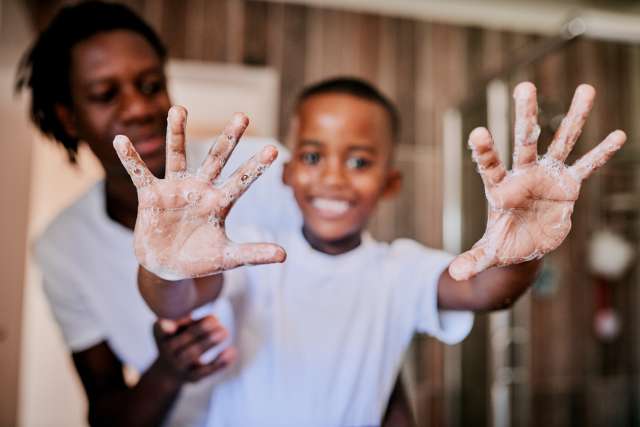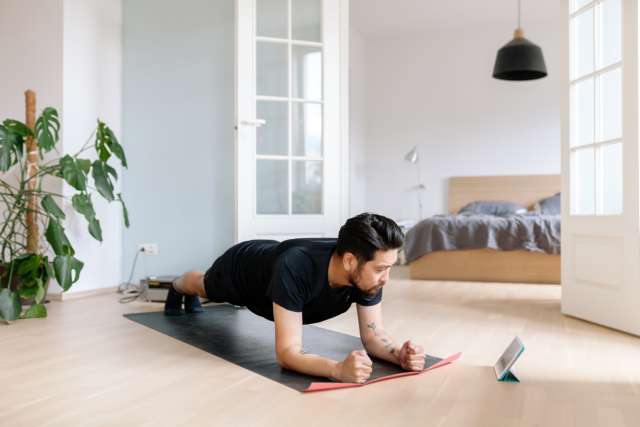Try these tips to help stop yourself from getting sick with a cold, flu, or other illness
Practicing healthy behaviors to keep yourself and others from getting sick is important all year round, but there’s a lot of confusing and sometimes overwhelming information on how to not get sick right now. It’s easy to fall into a click hole researching ways to stay germ-free to minimize your chances of getting sick. We’ve seen some, um, interesting ways of combating COVID-19 pop up on the internet. Cow urine as a cure? The experts say a resounding no.
Consciously working to prevent the spread of germs will not only help you and others stay healthy, but those who are at high risk for complications have a better chance of avoiding getting sick, too. Most individuals who get sick will not need any serious medical care and will recover in less than 2 weeks with over-the-counter medication. Some people, though, are more likely to get complications after getting sick. It’s obvious that we shouldn’t be around any elderly individuals, children, or pregnant women while feeling sick, but what about those at risk people we can’t see? For example, someone who suffers from asthma, diabetes, or has had a stroke.
To clear up confusion and provide you with science-backed ways to help prevent getting sick, we’ve compiled this comprehensive list of tips and practices to help you stay healthy.
Ways to Prevent Getting Sick
While there’s no way to guarantee you’ll avoid getting sick, these prevention tips will help reduce your risk of catching a cold, flu, or other illness.
1. Drink more water
While drinking water won’t simply flush the virus out of your system (another myth swirling out there), hydration has a significant impact on your ability to combat illness. Staying hydrated helps your body circulate
blood more freely, adds oxygen to your blood to speed recovery, and more. Did you know that a fever draws moisture out of your body, risking dehydration? Plus, you lose fluid as your body makes mucus and it
drains away. Thus, drinking more water helps your body recover faster! While the common recommendation is 8 glasses of water a day, science suggests 15 cups/day for men and 11 cups/day for women to fight off illness. 
You do want to make sure, though, that the water you drink doesn’t contain harmful contaminants. Get immediate access to clean and healthy water by installing a water such as our Claryum 3-Stage Max Flow under sink filter – which reduces 77 contaminants including chlorine, lead, asbestos, pesticides, and more.
2. Wash your hands
Hopefully you’re already washing your hands. How well are you washing though? A quick scrub and a rinse aren’t going to cut it when combating viruses. The CDC recommends washing your hands with warm, soapy water for at least 20
seconds. Need a self-timer? Hum Happy Birthday twice! If you don’t have immediate access to a hand-washing station, alcohol-based sanitizers will do the trick but washing your hands is always
preferred. 
3. Social distancing
If you’re feeling under the weather, stay home! Your office, the gym, and restaurants are all places where germs can thrive. If you have the luxury of working from home, do so. Instead of going to the gym, run outside or workout in your living room. Runner’s World recently released a great list of free workout streaming services you can use at home. If you still want to support local restaurants, try food to-go or purchase a giftcard to use later. If you do have to run an errand, the CDC recommends standing at least 6 feet away from someone to lessen the risk of sharing germs.
4. Avoid touching your face
We all do it. We scratch our nose, rub our eyes, rest our hand on our chin – all without thinking about it. An Australian study showed that a group of medical students touched their face 23 times per hour! Your nose and mouth are the easiest paths for a virus to enter your body. To avoid touching your face, make a conscious effort to stop (easier said than done). Set a reminder on your phone or place a sticky note on your desk. If you’re sitting still for a long period of time, try sitting on your hands or clasping them together.
…study showed that a group of medical students touched their face 23 times per hour!”
5. Cover your cough
Hygiene etiquette is critical to stop the spread of germs and viruses. Because viruses settle mainly in your nose, throat, and lungs, coughing and sneezing can easily spread germs. The CDC recommends covering your mouth and nose with a tissue when you cough or sneeze, or into the crook of your elbow if you can’t locate a tissue. Find the nearest sink and wash your hands as soon as possible. While on your way, try to touch as few surfaces as possible.
6. Clean and disinfect
Being diligent about cleaning often used household items is very important. We’re not saying that viruses live on your household surfaces, but in an effort to keep up your family’s overall health, it’s wise to increase your general cleaning routine, especially when more family members are at home. Household items like remote controls, appliances, faucet handles, light switches, doorknobs, and stair banisters should be sanitized every couple days. There’s also items in your house that you completely forgot about cleaning, but use them often. For example, your can opener or kitchen trash can. Items like these are often touched and can have food residue that lingers on them. Bacteria on these kitchen tools can multiply and transfer onto food the next time you touch them.
7. Help your immune system
A balanced diet ensures your body is getting all the nutrients it needs and can effectively build up antibodies and immunity to fight off an infection. Eating foods that are high in Vitamin C and D, like citrus fruits, veggies, and eggs, can boost immunity levels. The best source of Vitamin D without having to eat anything is sunlight! Additionally, getting enough sleep every night will help your immune system. A minimum of 7 hours of sleep will regulate immune functions, according to Sleep Foundation. Lastly, incorporating some physical activity into your daily routine will help lower the body’s stress hormones, protecting against illness.
Put yourself in the best position to avoid getting sick
You have a very important role to play to slow the spread of germs and viruses. These small changes, like drinking more water, can greatly affect your health and those around you. For more tips on how to stay healthy, we recommend you visit the CDC’s website at https://www.cdc.gov/. Here’s to your health!
